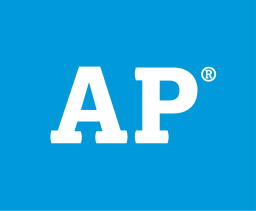Academics: Advanced Placement
At some point in your evaluation of boarding schools, you will examine the academics.
- That bucket covers a lot of ground.
- Academics broadly include teaching style and philosophy, the number and depth of subjects offered, and curriculum.
- Let's discuss curriculum and specifically one of the most commonly used, Advanced Placement (AP), as it is known colloquially.
The Advanced Placement logo is a trademark of the College Board and it's in the Public domain, via Wikimedia Commons.

What is AP?
AP or Advanced Placement Program is a three-year sequence of high school coursework offered by the College Board in over 40 subject areas.
AP courses provide college-bound high school seniors with a level academic playing field. It doesn't matter whether you are a high school student in Dubuque, Iowa, or Darien, Connecticut, because AP courses and their end-of-course examinations are the same regardless of where they are offered.
- The course content is the same.
- The teaching objectives are the same.
- The preparation for the final examinations is the same.
College admissions professionals can compare student academic achievements with confidence because the standard is the same everywhere, and the final examinations are proctored and graded by the College Board.
- They know precisely what AP means when they see it on your transcript.
- They know exactly what your AP scores represent.
That is the intrinsic value of AP Courses and their examinations from a college admissions point of view.
Admissions professionals want to know that an applicant's math courses at a public high school in Kansas are the same as those an applicant from a private school in Tennessee took.
- In other words, they want to compare apples to apples.
- So when one applicant offers a high school math course that is not an AP math course, the admissions staffers have to determine the course content and standards to compare that applicant's academic achievement with other applicants who took an AP math course.
- AP stands for qualitative and quantitative consistency in measuring academic achievement.
AP courses are optional but offer students the opportunity to work at a first-year college level.
- National examinations take place in May of the senior year.
- Most prep schools offer AP courses because a good grade in AP exams usually eliminates the need to take introductory college courses.
That means you can get on with more advanced courses as soon as you start college, saving time and money.
How Are AP Exams Scored?
AP exams use a five-point scale for scoring. A grade of 5 is the highest, 1 is the lowest. Read about AP scores and how they are calculated in AP Scores.
The scores are a combination of the scores on both sections of the examination. They are as follows:
- 5 - the highest and described by the College Board as "extremely well qualified"
- 4 - "well qualified"
- 3 - "qualified"
- 2 - "possibly qualified"
- 1 - "no recommendation"
Since coursework in a given subject is generally considered equivalent to a first-year college course, students who achieve a 4 or 5 are usually permitted to skip first-year courses.
This video explains how AP exams are scored.
How Are AP Courses Taught?
The interactive nature of the teaching is one of the features of the AP curriculum that appeals to most parents.
- Students in an AP class are involved in the discussions.
- They are not simply learning information that will never be used after the examination.
- They learn to share ideas. They discuss.
- They debate. AP courses help sharpen students' academic skills in ways that will benefit them in their college-level studies and later in life.
Combine AP courses with the small class size, which is common in most prep schools, and you have a solid academic combination for high school students.
- The secret to successful learning is a gifted teacher, as this video demonstrates.
- The College Board supports its Advanced Placement Courses with a full line of training aids and summer workshops.
- Online webinars make available best practices and what works for as wide a group of teachers as possible.
In What Subject Areas Are AP Courses Offered?
The AP offers over 30 courses in 7 subject areas. AP Capstone, Arts, English, History & Social Science, Math & Computer Science, Sciences and World Languages & Cultures comprise those subject areas. Find out more about them at AP Courses.
This video purports to offer a definitive list of AP courses.
Who Administers AP Courses?
While the College Board administers the Advanced Placement program, a panel of expert educators from around the U.S.A. guides all aspects of the program.
- Teachers also participate in reading the free-response sections of the exams each June. AP examinations take place during the first two weeks of May.
- AP examinations are standardized.
- They are administered in the same manner worldwide. As a result,
- both students and parents need to be familiar with AP Exam Policies.
- Failure to adhere strictly to all the AP rules and regulations could cost you your score.
How many AP courses should you take?
- Most prep schools offer Advanced Placement courses.
- Some schools offer six to eight AP courses. Others offer over 20 AP subjects.
- Schools that do so have to maintain a highly qualified and experienced faculty to achieve good results in these rigorous examinations.
- Put another way, their academic reputation is on the line.
- The quality of curriculum and course offerings is yet another aspect of any prep school that parents should consider while evaluating schools.
Who scores AP exams?
AP Higher Education states: "The multiple-choice sections of AP Exams are scored by computer. Each summer, the free-response sections are scored at the annual AP Reading by experienced AP teachers and college faculty who have experience teaching corresponding college courses. Approximately half of the Readers are college faculty. Readers are selected to ensure an appropriate balance among several factors, including school locale and setting, gender, race, ethnicity, and years of teaching experience."
Points of Comparison With IB and Progressive Education
Think of AP as the center if you had to characterize AP and where it fits into the high school spectrum.
- Then on the left would be progressive education, and on the right would be the International Baccalaureate program.
- Advanced Placement courses reportedly have a favorable impact on college admissions decisions.
- I encourage you to explore the AP website.
- It has several articles which will help you decide if AP fits your requirements and objectives.
- I recommend that you begin your exploration AP, IB, and progressive education options when your child is in 6th or 7th grade.
- By doing that, you will have a very clear idea of what kind of schools you will want to focus on as you get closer to your child's high school years.
- Knowledge is always power when it comes to making major decisions.
- Explore your options thoroughly and understand the pros and cons of Advanced Placement courses, International Baccalaureate, and progressive education.
Conclusion
Understanding AP courses is crucial for making informed decisions about your child's educational journey. Whether your student takes six courses or twenty, AP programs offer standardized academic rigor that colleges recognize and value. As you evaluate boarding schools, consider their AP offerings alongside other factors like teaching quality and curriculum breadth. Start exploring these options early - ideally in 6th or 7th grade - to ensure you choose the academic program that best aligns with your child's goals and abilities.
Questions? Contact us on Facebook. @boardingschoolreview
#BoardingSchools #APCourses #CollegePrep #PrivateEducation #AdvancedPlacement #AcademicExcellence
More About Academics
How Do They Teach? | What Do They Teach?
Checklist for Comparing Schools - Curriculum and Instruction
5 Facts About Progressive Schools | International Baccalaureate















